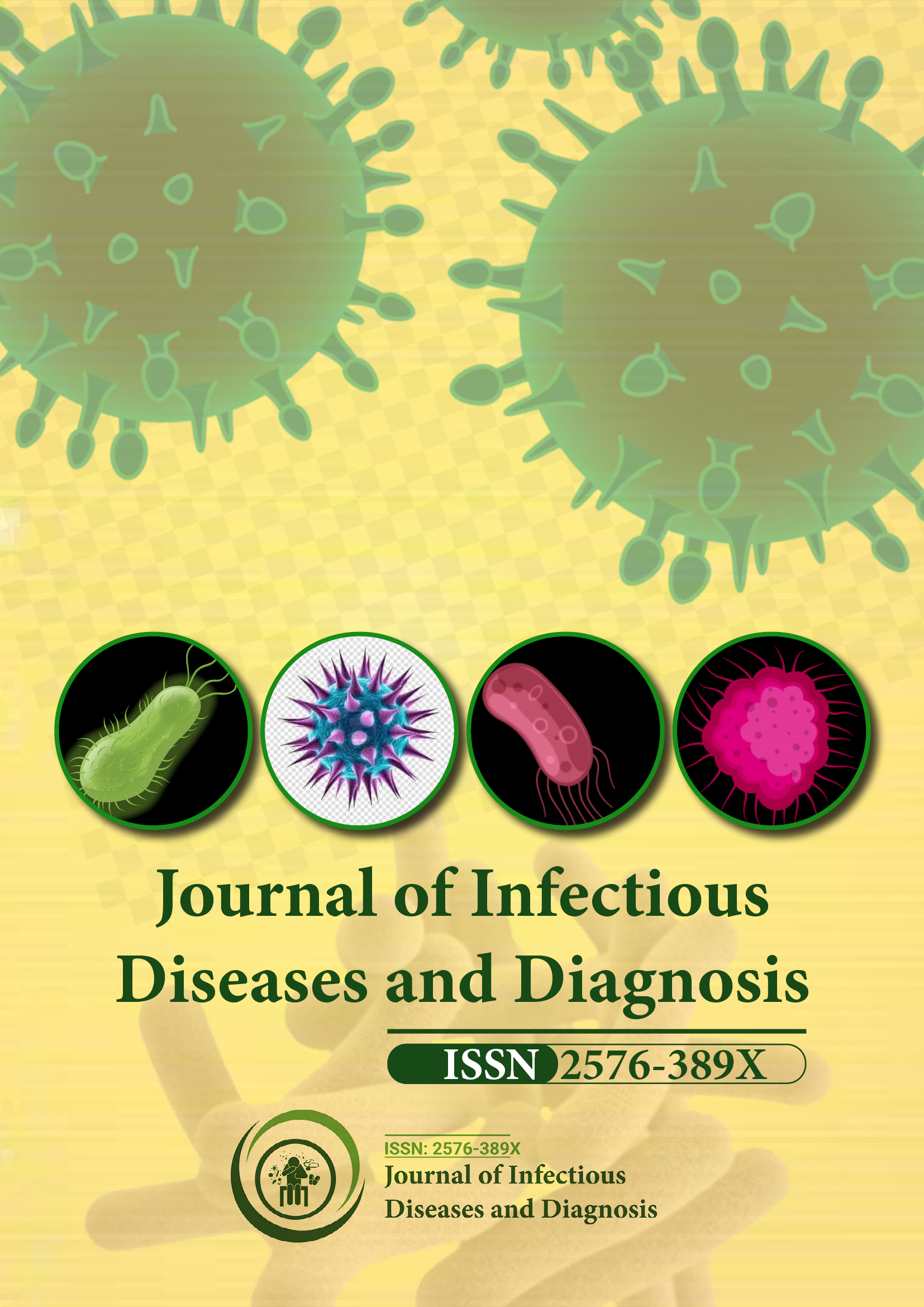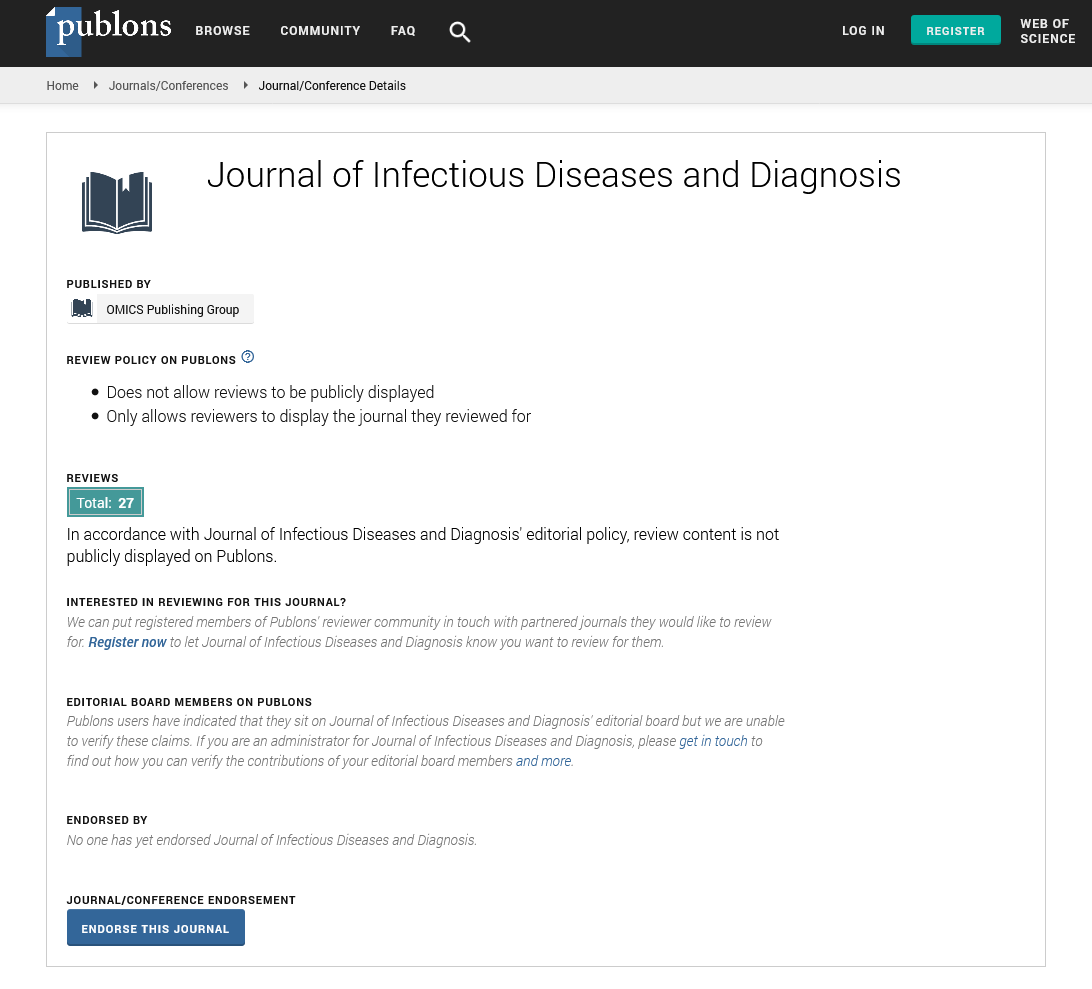Indexed In
- RefSeek
- Hamdard University
- EBSCO A-Z
- Publons
- Euro Pub
- Google Scholar
Useful Links
Share This Page
Journal Flyer

Open Access Journals
- Agri and Aquaculture
- Biochemistry
- Bioinformatics & Systems Biology
- Business & Management
- Chemistry
- Clinical Sciences
- Engineering
- Food & Nutrition
- General Science
- Genetics & Molecular Biology
- Immunology & Microbiology
- Medical Sciences
- Neuroscience & Psychology
- Nursing & Health Care
- Pharmaceutical Sciences
Perspective - (2023) Volume 8, Issue 5
Balancing Act: Inflammatory Responses, Pregnancy, and Late-Onset COVID-19
Rebekah Thomas*Received: 04-Sep-2023, Manuscript No. JIDD-23-23539; Editor assigned: 06-Sep-2023, Pre QC No. JIDD-23-23539 (PQ); Reviewed: 20-Sep-2023, QC No. JIDD-23-23539; Revised: 27-Sep-2023, Manuscript No. JIDD-23-23539 (R); Published: 04-Oct-2023, DOI: 10.35248/2576-389X.23.08.236
Description
The COVID-19 pandemic, caused by the novel coronavirus SARS-CoV-2, has affected every facet of human life, from health and economics to social and psychological well-being. While much attention has been focused on the acute effects of the virus on respiratory health, growing evidence suggests that SARS-CoV- 2 can also have profound implications for pregnancy, particularly when infection occurs later in gestation. This study explains the impact of SARS-CoV-2 infection late in pregnancy on inflammatory responses within the placenta, a major organ for fetal development, and considers the implications for maternal and neonatal health.
The placenta is a remarkable organ that develops during pregnancy and plays a vital role in sustaining the growing fetus. It serves as a bridge between the maternal and fetal circulatory systems, facilitating the exchange of nutrients, oxygen, and waste products. In addition to its nutrient transport functions, the placenta also serves as an endocrine organ, producing hormones that support pregnancy.
The placenta acts as a barrier to protect the developing fetus from infections and pathogens. However, the placenta's protective role is not absolute, and some viruses, including SARS-CoV-2, can potentially breach this barrier. The extent, to which the virus may affect the placenta, and consequently fetal health, remains a topic of active investigation.
Inflammatory responses in pregnancy
Inflammation is a fundamental immune response to infection and injury, serving to protect the body and promote healing. In pregnancy, controlled and regulated inflammation is essential for the placental development, fetal growth, and overall maternal health. However, excessive or uncontrolled inflammation can lead to various complications, including preterm birth, preeclampsia, and fetal growth restriction.
Inflammation is needed to facilitate the immunological adaptations necessary for fetal development, while on the other, excessive inflammation can be detrimental to both maternal and fetal health. Therefore, maintaining a delicate balance in the inflammatory response is of most important.
SARS-CoV-2 and late pregnancy
SARS-CoV-2 has been shown to exploit the Angiotensin- Converting Enzyme 2 (ACE2) receptor to enter human cells. This receptor is present in several tissues, including the respiratory tract and, notably, the placenta. Therefore, it is theoretically possible for the virus to infect placental cells and affects an inflammatory response when infection occurs late in pregnancy.
Several recent studies have investigated the presence of SARS-CoV- 2 in placental tissue from infected pregnant individuals. While findings have been mixed, with some studies reporting the presence of the virus in placental tissue and others not, there is a growing body of evidence suggesting that the virus can reach the placenta. When the virus enters placental cells, it may affect an immune response, potentially leading to inflammation.
Inflammatory responses in the placenta
Inflammation in the placenta, often referred to as chorioamnionitis or placental inflammation, can arise due to various causes, including infection. This inflammation can disrupt the placenta's functions, impacting fetal well-being and potentially leading to preterm birth. In the context of SARS-CoV-2 infection, a critical question is whether the virus itself or the body's response to the virus affects placental inflammation. The findings indicated a higher prevalence of inflammatory responses in the placentas of COVID-19-positive individuals compared to those without the virus. This suggests that SARS-CoV-2 infection late in pregnancy can indeed lead to placental inflammation.
The impact of placental inflammation extends beyond the placenta itself. When the placenta is inflamed, it can result in the release of inflammatory molecules into the fetal circulation, potentially affecting the developing fetus. This is a significant concern, as fetal exposure to inflammation is associated with an increased risk of adverse outcomes, including preterm birth, neurodevelopmental issues, and long-term health problems.
Clinical implications and ongoing research
Understanding the inflammatory responses in the placenta upon SARS-CoV-2 infection late in pregnancy is of predominant for clinical care and management. Here are some key clinical implications and areas of ongoing research:
Screening and monitoring: Pregnant individuals should be screened for SARS-CoV-2 infection, especially if they are in the later stages of pregnancy. Monitoring placental health and fetal development through ultrasound and other diagnostic tools is essential in cases of COVID-19.
Management: Management of pregnant individuals with COVID-19 should be modified to their specific circumstances, including gestational age and the presence of placental inflammation. Decisions regarding timing and mode of delivery should be made in consultation with healthcare providers.
Treatment: Research into potential treatments to mitigate placental inflammation in COVID-19 cases is ongoing.
Therapies to modulate the immune response and reduce the risk of adverse pregnancy outcomes are being explored.
Neonatal care: Neonatal care should be adapted to address potential complications associated with placental inflammation, including preterm birth and neurodevelopmental issues.
Long-term follow-up: Long-term follow-up of neonates exposed to SARS-CoV-2 and placental inflammation is essential to monitor for any developmental and health issues that may arise.
Conclusion
In conclusion, the relationship between SARS-CoV-2 infection late in pregnancy and inflammatory responses in the placenta is a topic of growing concern and active research. As we continue to learn more about the impact of COVID-19 on pregnancy, it is crucial to translate this knowledge into clinical practices that prioritize the health and well-being of both mothers and infants. Ultimately, this understanding will contribute to better care and management for pregnant individuals during the ongoing pandemic and beyond.
Citation: Thomas R (2023) Balancing Act: Inflammatory Responses, Pregnancy, and Late-Onset COVID-19. J Infect Dis Diagn. 8:236.
Copyright: © 2023 Thomas R. This is an open-access article distributed under the terms of the Creative Commons Attribution License, which permits unrestricted use, distribution, and reproduction in any medium, provided the original author and source are credited.

